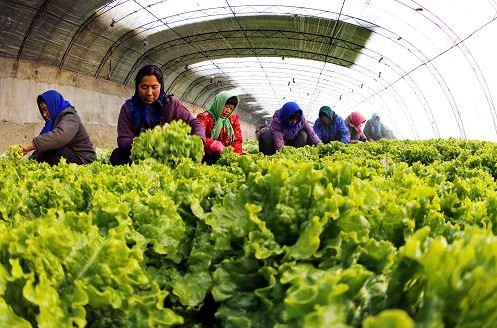Cooperatives' role in promoting economic development
- By Eugene Clark
 0 Comment(s)
0 Comment(s) Print
Print E-mail China.org.cn, July 4, 2017
E-mail China.org.cn, July 4, 2017
|
|
|
In modern China, there are hundreds of thousands of Chinese cooperatives, especially in the agricultural sector. [iqilu.com] |
July 1, 2017 was the 95th Anniversary of International Cooperative Day. Around the world, cooperatives have played and continue to play an important role in helping people organize to create better conditions for workers and small business and enable disparate groups to compete more favorably against larger industry players such as major corporations. In doing so, they have helped to promote greater equality within society, a role that is especially important at a time when digital transformations and modern forms of capitalism have tended to result in a concentration of power and greater disparity. As stated by the International Cooperative Alliance (https://ica.coop/en/media/news/95th-international-co-operative-day ) the open membership of cooperatives:
"…affords access to wealth creation and poverty elimination. This results from the co-operative principle on member economic participation: 'Members contribute equitably to, and democratically control, the capital of their co-operative'. Because co-operatives are people-centred, not capital-centred, they do not perpetuate nor accelerate capital concentration and they distribute wealth in a more fair way."
Cooperatives exist across most sectors of the economy and promote entrepreneurship, democratization, and building of communities. Cooperatives are not charities; they are an organized group of self-help entrepreneurs who want to make a difference in their communities and region. They have been especially impactful in rural and regional areas. For example, in my home state of Kansas in the US, rural cooperatives play a major role in building communities and promoting economic prosperity. They educate community members about business and other skills, enhance networks, support community development and more.
In recognition of the importance and impact of cooperatives, the United Nations Educational, Scientific and Cultural Organisation (UNESCO) includes cooperatives on its list of the intangible cultural heritage of humanity. UNESCO acknowledges that the human experience is not defined only by tangible places and monuments, but equally by practices and traditions. A member-state must make such a nomination. Germany, for example, in nominating cooperatives, noted that cooperatives 'strive for a more just development of globalization processes.'
Activities undertaken by cooperatives today are playing an increasingly larger and important role in countries such as China, Australia and many others. In China, cooperatives in various forms have existed for almost a hundred years. While organizing in cooperatives has been largely an ‘economic’ and community building movement, they have also served other roles. For example, historically, the ‘Gung Ho" ( 工合 "Gōnghé", meaning ‘work together’) industrial cooperatives movement in the 1930’s started as a way to organize in order to increase production to aid in China’s ‘War of Resistance’ against occupying Japanese forces. The term, ‘Gung Ho,’ has become part of the English language meaning hard work and total dedication to a cause.
In modern China, there are hundreds of thousands of Chinese cooperatives, especially in the agricultural sector. Since the 1980’s a Chinese legal infrastructure and government support and encouragement have helped to encourage the growth of cooperatives and the economic development and community building they do.
In Australia the first cooperative was registered in 1859 and are active across many areas of activity, including: agriculture, banking, service sectors, housing, retail, insurance, wholesale and purchasing. According to the Australian Business Council of Cooperatives and Mutuals there are:
• Over 1700 co-operative, mutual and member-owned businesses operating nationally
• More than 13.5 million memberships generating a turnover of over US$25 billion p.a
• Co-operatives and mutuals including member-owned superfunds contribute around 7 percent of our country’s earnings
• Motoring organisations are owned by more than 7 million members
• Mutual insurers and friendly societies provide insurance to more than 2.3 million Australians
• Customer owned banks, credit unions and building societies have 4.5 million members
Notwithstanding the importance of cooperatives, my experience with formal legal education in multiple countries, suggests that law schools have given insufficient attention to cooperatives and the role they play in society. There is an urgent need for greater government support, education and continuing research on how to improve governance, promote modern management/accounting practices and enhance other facets of operation of cooperatives. In this way, cooperatives may develop their full potential in helping people and communities organize to promote the economic and social well-being and development their communities and regions.
Eugene Clark is a columnist with China.org.cn. For more information please visit:
http://www.china.org.cn/opinion/eugeneclark.htm
Opinion articles reflect the views of their authors only, not necessarily those of China.org.cn.







Go to Forum >>0 Comment(s)